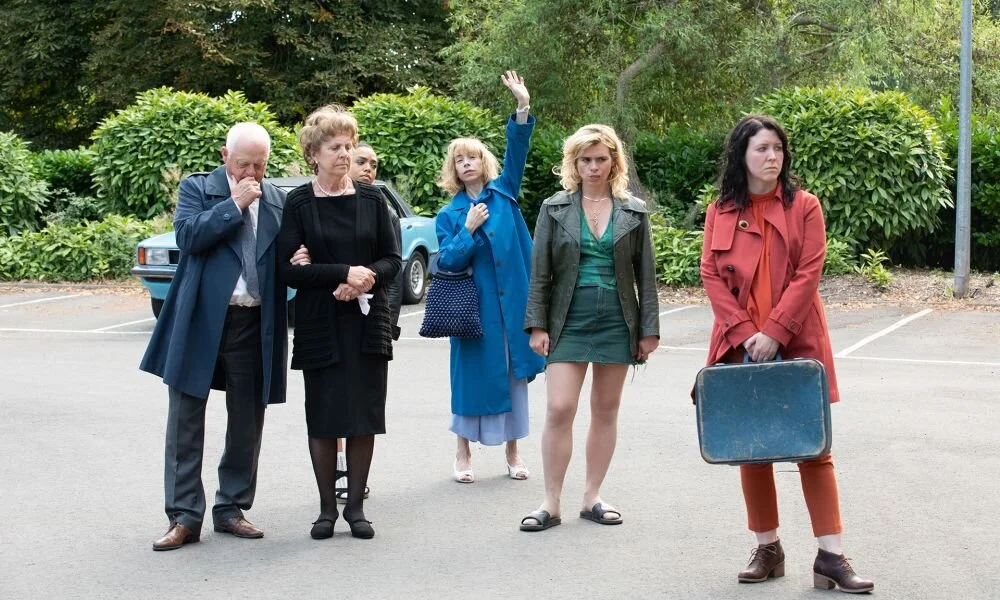Sally Hawkins is a woman on the edge in 'Eternal Beauty'
By Andrea Thompson
Movies about women that are written AND directed by men don’t have the best track record, but “Eternal Beauty” bucks the trend for the most part, even if part of that is a natural consequence of being privileged enough to have Sally Hawkins as your lead. Craig Roberts has been acting since the early aughts, but he’s only recently come to direct, with “Eternal Beauty” being only his second feature.
And what a feature it is, with a use of color that’s as stylized as another Sally Hawkins vehicle, “The Shape of Water,” although it’s used to far different, and subtler ends in “Eternal Beauty.” Hawkins is a marvel as usual, but she shines so brightly because the role she plays is still an all too rare one. Jane is a woman who suffers from schizophrenia, and her mental illness by no means prevents her from being a fully realized person. Nor is it used as an excuse for quirkiness or bizarre plot twists, as was the case for offerings as wide-ranging as “Horse Girl” and “Take Shelter.”
If we somehow didn’t get the message from the stiffness of Jane’s gait as she makes her way through her drab world, with all its indicators of a woman on the edge, her face, which is practically a road map of sadness, confirms it. Such pain typically requires a support system to make it livable, but between Jane’s viciously critical mother (Penelope Wilton), and her selfish, exploitative sister Nicola (Billie Piper), Jane’s safety net clearly needs mending. Her other, far more supportive sister Alice (Alice Lowe) does what she can, but in the face of such dysfunction, and at best, indifference, her help is bound to be limited.
The painful result is Jane’s constantly fluctuating mental and emotional state. Craig Roberts mostly keeps us in Jane’s perspective, but he flits in and out of it enough for us to understand just how discomfiting it can be from without and within. Jane generally means well, but her schizophrenia also drives her to actions that are truly unsympathetic, and sometimes results in those around her suffering from emotional and sometimes, physical consequences.
If Jane is sometimes truly unsettling, her eventual love interest Mike (David Thewlis), who suffers from his own form of mental illness, is even more so, even if he can be sweet. Other films might have had their connection as a kind of saving grace, with two outcasts finding each other to create their own happiness in surroundings which are often defined by their bleakness. But shortcuts to happiness are nonexistent in a film that questions whether such a state is even possible, dressing such flights of fancy in vibrant reds, and true happiness in calmer, ethereal blue tones.
“What if there’s no such thing as happiness, only moments of not being depressed?” Jane asks when she has a revelation of sorts. It’s an interesting question, but “Eternal Beauty” isn’t quite able to fulfill its own ambitions, indulging in a few delusions of its own. How else do you explain a family that functioned almost as an obstacle to stability suddenly becoming loving and affectionate once Jane is able to find peace during a hospital stay and finally walk out into a sunlit world that seems to offer some brightness at long last?
Samuel Goldwyn Films
At least Roberts keeps easy conclusions to a minimum, refusing to box Jane into territory verging on uplifting or inspirational. His approach to her mental state is a complex one, with medications easing Jane’s pain but not ending it. The method to her madness applies to her and her alone and involves, yes, acceptance, but also letting go of the past she has idealized to cope with her present reality. Her happyish ending has her embracing her mental illness as a kind of shield, a way to prevent herself from falling in line with a normality she finds endlessly dull and has never been comfortable with in the first place.
Between this and “Rare Beasts,” I'm starting to think that the U.K. is a very depressing place to be right now. “Eternal Beauty” doesn’t wallow in its own misery like “Rare Beasts,” but I hope an entire country isn’t really in such desperate need of a Xanax, or something truly sinister, like an opiate for the masses that are increasingly depicted being as disturbingly hungry for exactly that.
Grade: B+





